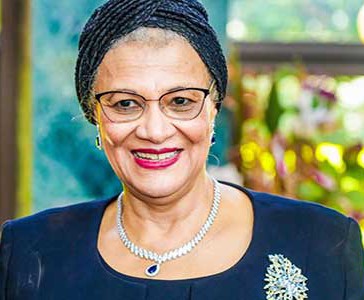By Olaniran Obele
Nigeria has a problem. The collapse of a system of effective democratically elected local government councils. Section 3(6) of the
Constitution of the Federal Republic of Nigeria, 1999 as amended recognizes seven hundred and sixty eight local government areas as listed in the second column of Part I of the First Schedule of the Constitution and six area councils for the Federal Capital Territory as shown in Part II of that Schedule. These local government areas, by virtue of section 7(1) of the Constitution, are meant to be democratically elected
and every State Government subject to section 8 of the Constitution, must ensure the existence of a democratically elected local government councils under a law which provides for the establishment, structure, composition, finance and functions of such councils.
These local government councils were meant to be recruiting grounds for future leaders for the State and Federation. Instead of doing this, they became an avenue to entrench dictatorship and misgovernance by State Governors. Local Government Councils were also meant to participate in economic planning and development of their areas pursuant to the enactment of an economic planning law by Houses of Assembly of the various States. This writer doubts whether most States have that law. By virtue of section 7(5) of the Constitution, State Laws shall confer upon local government councils functions that will include those set out in the Fourth Schedule to the Constitution. These functions include the development of agriculture, registration of births, deaths and marriages, amongst others. That constitutional system failed. Why? It is because of section 162(5) and (6) of the Constitution.
By virtue of section 162(1) of the Constitution, a special account called “THE FEDERATION ACCOUNT” is created. All revenues collected by the Government of the Federation except some exempted revenues go into the account. The amount in the account by virtue of section 162(3) shall be distributed among the Federal and State Governments and the Local Government Councils on such terms and in such manner as may be prescribed by the National Assembly. That was the basis for the enactment of the Revenue Mobilisation, Allocation and Fiscal Commission Act by the National Assembly. Based on this law, the federating States receive their allocation by virtue of section 162(4) of the Constitution.
Because local government councils are not the federating States, section 162(5) of the Constitution provides that the amount due to the local government councils shall also be allocated to the State for the benefit of their local government councils on such terms and in such manner as may be prescribed by the National Assembly. The Revenue Mobilisation, Allocation and Fiscal Commission Act therefore ought to have also gone further in this regard but this is not the issue here.
The Constitution in section 162(6) provided that the funds due to the local government councils shall be paid into a trust account maintained by each State Government called the “STATE JOINT
LOCAL GOVERNMENT ACCOUNT”. State Governments were to receive funds due to their local government councils from the Federation Account into that account and also fund the account. By virtue of section 162(7) and (8) of the Constitution, the funds in the trust account were to be distributed to the democratically elected local government councils on such terms and manners as prescribed under the laws of the State which must not contradict the Federal Law and the Constitution.
The problem however as earlier stated is that State Governments emasculated the local government councils and utilized the funds as it pleases them. Local Government Councils were therefore not well funded. They could not perform their duties. Insecurity skyrocketed. Unemployment soared. Hunger roamed the land. All things fall apart. Leadership recruitment from grass root failed and we have the disorder of today.
This was the background to the filing of Appeal Number SC/343/2024 (Attorney General of the Federation v. Attorney General of Abia State and others) by the Attorney General of the Federation. On 11th July 2024, the Supreme Court, at the speed of light, delivered its monumental judgment. Many people have been commenting on the judgment. This write up is to lay bare the basic principle of equity applied by the Supreme Court in arriving at its judgment.
In the lead judgment, Justice E.A. Agim held that ‘the Constitution could not have intended by those provisions that States should retain money distributed by the Constitution to the third tier of government and use same for their benefit. This is because if States retain and use the money…., it would defeat the constitutional provisions in 162(3) …The States collect the money as agents of the Federation to convey and deliver same to the Local Government Councils …’ Justice Agim therefore sees the role of the States as that of agents of the Federal Government to collect and deliver Local Government Councils’ share of the federation account to them. Where this agency fails, the Federal Government has a duty to file the suit and ensure that the purpose of the constitutional agency is fulfilled. It appears that Justice Agim did not adumbrate on the role of the States as trustees for the benefit of Local Government Councils but his brother Justices of the Supreme Court filed this important void.
Justice Chioma Egondu Nwosu-Iheme in his concurring judgment aptly captured the aim of the suit as one filed ‘to curb the excesses of some recalcitrant Governors of States who run local government councils as part of their household or parastals.’ In fulfilling all righteousness, Justice Moore Aseimo Abraham Adumein held that ‘local government system in Nigeria is a matter of constitutional significance…the third tier of government of the federation, having their political and financial independence duly guaranteed…However, in delivering same as trustees, the States have unfortunately been using the allocation due to local government councils as if they are the owners…The chokehold on the allocation to local government councils, from the Federation Account, by the States has to be stopped by the court…’
Justice Garba in his concurring judgment held that ‘…for support and emphasis..’ , he sees the fulcrum of the case as one filed to entrench a system of democratically elected local government that is effective, functional and with financial and political autonomy. According to the erudite Justice, a statutory trust exist with the local government councils as the beneficial owners of the funds under the control of State Governments.
Justice Haruna Simon Tsammani in his concurring judgement held that the Constitution ‘envisages that… three tiers of government shall co-exist in a democratic setting…Since the Local Government Councils are mandated to participate in the economic planning and development of the areas over which they exercise authority, how can they exercise that constitutional mandate if the monies allocated to them are withheld by the States?…I believe that sections 162(5) and (6) were enshrined in the Constitution in order to reduce the inconvenience and logistic difficulty of each local government having to run to Abuja every month for collection of its own allocation…I hope that this judgment will put an end to the commandeering of funds meant for the Local Government by state governors.’
Justice Jamilu Y. Tukur in his concurring judgment sees the ‘the grouse of the plaintiff …predicated on the infringement of a very crucial part of the constitution …Governance Structure of the Federation …The payment to the State Governments of the share due to the local government councils …merely makes the State governments trustees of such funds…’ Justice H.A.O. Abiru in refusing to engage in judicial legislation but allowing the case in part in his concurring judgment agrees that ‘it is not in dispute that the Constitution guarantees the existence of a democratically elected system of governance at each of the three tiers of Government…It is not in dispute that the Constitution does not provide or envisage a situation where any of the tiers of Government will be controlled, governed and/or managed otherwise than by a democratically elected system of governance…the Local Government Councils are the sole beneficiaries of the funds standing to the credit of local government councils in the Federation Account and which are allocated to the States. The States only act as trustees of the funds for the Local Government Councils…’ The Honourable Justice Abiru, in dissenting from the majority decision, held that Local Government Councils cannot collect money directly from the Federation Account since it will be a departure from constitutionality.
Much discourse has been on interpretation of SHALL and judicial legislation by the Supreme Court. In its judgment, the Supreme Court looked at two principles of our received English law heritage; agency and trusteeship. The lead Judgment focused more on the doctrine of agency while it fundamentally applied the doctrine of trusteeship. Justices Garba, Tsammani, Abiru, NwosuIheme, Tukur and Adumein reasoned based on the doctrine of trusteeship.
Under English law, according to the learned authors of Snell’s Equity, a person in whom a property is vested called the trustee is compelled in equity to hold the property for the benefit of the beneficiary or for some legally enforceable purpose other than his own. In this regard, section 162(6) of the Constitution created what can be termed a constitutional trust. Learned authors of Snell’s Equity would describe what we call a constitutional trust as statutory trust or public trust. According to them, public trust are ‘charitable, according to the legal definition of charity. It must also promote public welfare even if incidentally it confers a benefit on an individual or class. A charitable trust is enforced by the Attorney General or the Charity Commission.”
In this regard, the States are the trustees while the Local Government Councils are the beneficiaries. The Federal Government of Nigeria is the protector of this trust. Where the trustees fail in their responsibility, equity will not allow the trust to fail but will still confer benefits on the beneficiaries. Essentially, what the Supreme Court did in ordering direct payment to the democratically elected Local Government Councils is ensuring that the purpose of the trust is carried out. My Lord Justice E.A. Agim in the lead judgment was therefore wrong when he applied the doctrine of agency instead of the equitable principle of trusteeship.
More importantly, The Supreme Court was wrong in altering the definition of SHALL under section 162(6) of the Constitution. This is legal fiction and unnecessary in justifying an otherwise sound judgment. SHALL is SHALL and the drafters of the Constitution did not lightly use SHALL. The reference to a progressive interpretation of the Constitution was unnecessary. The concurring decision of Justice Abiru, while failing in properly applying principles of trust might have helped his brother Justices in running away from the trap of defining SHALL in section 162(6). It would have made more legal sense if my noble Lords had followed principles of law of trust to the end and hold that the States failed in carrying out the trust hence the trust is set aside and the beneficiaries should be entitled to the funds directly pending when the States would be willing, ready and able to perform their roles as trustees under section 162(5) and 162(6) of the Constitution..
Be that as it may, the ends of justice have been met by the decision. The Attorney General of the Federation has through legal wisdom given our people in the rural areas their independence from the dictatorship of their internal colonial masters, the Governors. The fear however is whether this gubernatorial dictatorship would not be replaced by the dictatorship of Mr. President.
Obele is the Lead Counsel at LiberteVie Law Practice, a Lagos based law firm. He can be contacted at olaniran@libertevielaw.com
In this article

